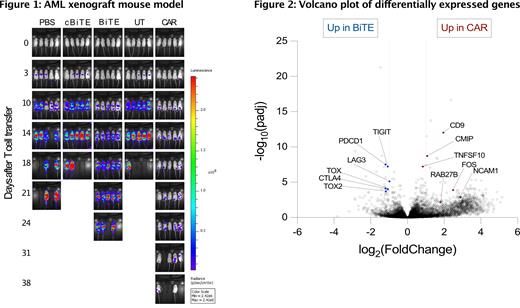Translation of the success of bispecific T cell engagers (BiTE®) and CAR T cells from B-cell to myeloid malignancies has been challenging. Identifying suitable target antigens in myeloid malignancies has been hampered by expected on-target-off leukemia toxicity. FLT3 presents with a rather favorable expression profile due to broad AML expression and limited expression within the normal hematopoietic compartment (Brauchle et al., 2020). Importantly, expression on AML bulk cells and leukemic stem cells is observed independent of FLT3 mutational status. Here, we compared two T-cell based immunotherapy approaches, BiTE® vs CART, in targeting FLT3 in AML.
We tested BiTE® and CAR-mediated cytotoxicity against several AML cell lines and primary AML (pAML) cells in vitro. On-target off-leukemia toxicity was evaluated in mixing assays of pAML cells and healthy donor bone marrow (hBM). The impact of positive costimulation on both approaches was tested using our previously established Ba/F3 model system (Marcinek et al., 2023), which is devoid of any human costimulatory molecules. As a surrogate for synapse formation, conjugate formation as well as consecutive T-cell degranulation were studied. Further, we studied the cell death pathway mediating cytotoxicity against AML target cells, e.g. FAS/FASL vs perforin/granzyme B. The impact of continuous stimulation by BiTE®-and CART on evolving T-cell exhaustion was tested using our previously established 28-day long-term culture assay (Philipp et al., 2022). Finally, we compared BiTE® and CAR in an in vivo xenograft AML model. In a second in vivo experiment, all mice were harvested 18 days after T-cell injection, followed by T-cell isolation from the bone marrow and subsequent bulk RNA sequencing.
BiTE®- and CAR-redirected T cells led to comparable effector-to-target (E:T) ratio-dependent specific lysis of various AML cell lines and pAML cells. Using our in vitro mixing experiments, we could show that BiTE®- and CAR-redirected T cells efficiently killed pAML cells while mostly sparing the hBM. Using the Ba/F3 model system, we observed that the expression of the costimulatory molecule CD86 significantly increased the cytotoxicity of BiTE®-redirected T cells while CAR-mediated lysis was unaltered. Furthermore, we were able to show that the percentage of T cell-AML conjugates formed as well as degranulation of CD107a was significantly higher when using CART compared to BiTE® molecules. Interestingly, when we added a FAS-blocking antibody to our cocultures, we could show that CART-mediated lysis of the target cells was significantly reduced. This was not observed when using the BiTE® construct. Using our long-term culture system, we found that T-cell proliferation and cytokine secretion decreased with both constructs over time. The cytotoxic capacity of BiTE®-redirected T cells seemed to decrease faster compared to the CART construct. Moving to an in vivo AML xenograft model, we observed that CART-treated mice had an improved OS compared to the BiTE®-treated mice (Fig.1). This was accompanied by enhanced T-cell proliferation and splenic homing of the CAR T cells. Bulk RNA sequencing of T cells isolated from the murine bone marrow 18 days post T-cell injection revealed signs of exhaustion in BiTE®-redirected T cells compared to CAR T cells. We found an upregulation of several inhibitory immune receptors and transcription factors (Fig.2) that have been well described to promote T-cell exhaustion. Furthermore, gene set enrichment analysis revealed that genes upregulated in effector vs exhausted were also upregulated in CAR T cells. This was accompanied by an upregulated glycolysis and fatty acid metabolism in CAR T cells.
We conclude, that FLT3 is a promising target antigen with limited on-target off-leukemia toxicity. Our preclinical in vitro data demonstrate similar cytotoxicity of both platforms against AML cell lines and pAML cells. Utilizing a xenograft mouse model, CAR T cells provided a significant survival benefit over BiTE® molecules. Our data support the hypothesis that positive costimulation integrated within the CAR construct provided an advantage in T-cell activation and might lead to better T-cell homing, resulting in improved efficacy and delayed T-cell exhaustion in vivo. Future studies will be needed to further dissect differences between BiTE® vs CAR T cell-based immunotherapy platforms and identify suitable combination partners.
Disclosures
Brauchle:Adivo: Current Employment. Märkl:Plectonic Biotech: Current Employment. Goldstein:Merck Research Laboratories: Current Employment; AMGEN Inc.: Ended employment in the past 24 months. Kobold:Carina Biotech: Other: IP License; TCR2 Inc: Honoraria, Other: IP License, Research Funding; Arcus Biosciences: Research Funding; GSK: Honoraria; Novartis: Honoraria; Tabby Therapeutics: Research Funding; Miltenyi Biotech: Honoraria; Plectonic: Research Funding; BMS: Honoraria. Chapman-Arvedson:Hexagon Bio: Current Employment; AMGEN Inc.: Ended employment in the past 24 months. Buecklein:Roche: Honoraria, Research Funding; Amgen: Consultancy; Pfizer: Consultancy, Honoraria, Speakers Bureau; Miltenyi Biotech: Research Funding; Gilead/Kite: Other: Travel Funding, Research Funding; Pierre Fabre: Other: Travel Funding; BMS: Research Funding; Priothera: Consultancy. Subklewe:Janssen: Consultancy, Honoraria, Research Funding, Speakers Bureau; AstraZeneca: Speakers Bureau; Takeda: Consultancy, Honoraria, Research Funding; Miltenyi Biotec: Consultancy, Honoraria, Research Funding; Pfizer: Consultancy, Honoraria, Other: Travel Support, Speakers Bureau; Ichnos Sciences: Consultancy, Honoraria; Seagen: Research Funding; Roche: Consultancy, Honoraria, Other: Travel Support, Research Funding, Speakers Bureau; Novartis: Consultancy, Honoraria, Research Funding, Speakers Bureau; Gilead/Kite: Consultancy, Honoraria, Other: Travel Support, Research Funding, Speakers Bureau; BMS/Celgene: Consultancy, Honoraria, Research Funding, Speakers Bureau; Amgen: Consultancy, Honoraria, Research Funding; AvenCell: Consultancy, Honoraria; Incyte Biosciences: Consultancy, Honoraria; Molecular Partners: Consultancy, Honoraria, Research Funding; GSK: Speakers Bureau; LAWG: Speakers Bureau; Springer Healthcare: Speakers Bureau; AbbVie: Consultancy, Honoraria; Autolus: Consultancy, Honoraria; advesya (CanCell Therapeutics): Consultancy, Honoraria; Genmab US: Consultancy, Honoraria; Interius BioTherapeutics: Consultancy, Honoraria; Nektar Therapeutics: Consultancy, Honoraria; Orbital Therapeutics: Consultancy, Honoraria; Sanofi: Consultancy, Honoraria; Scare: Consultancy, Honoraria.


This feature is available to Subscribers Only
Sign In or Create an Account Close Modal